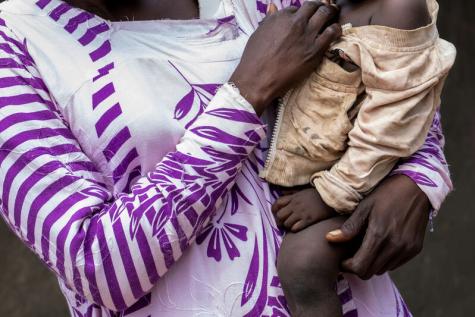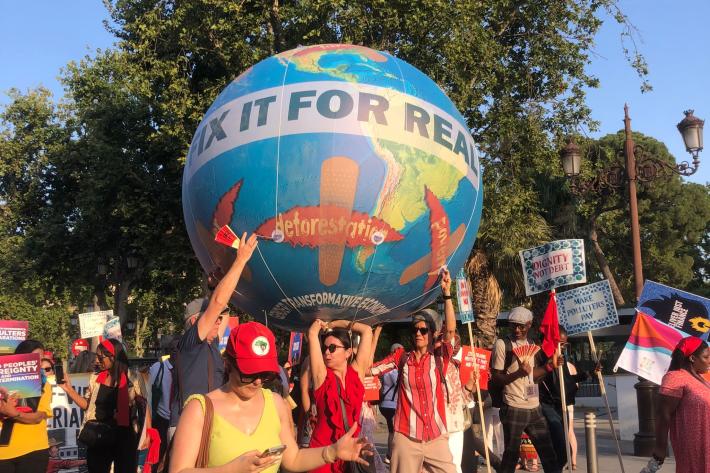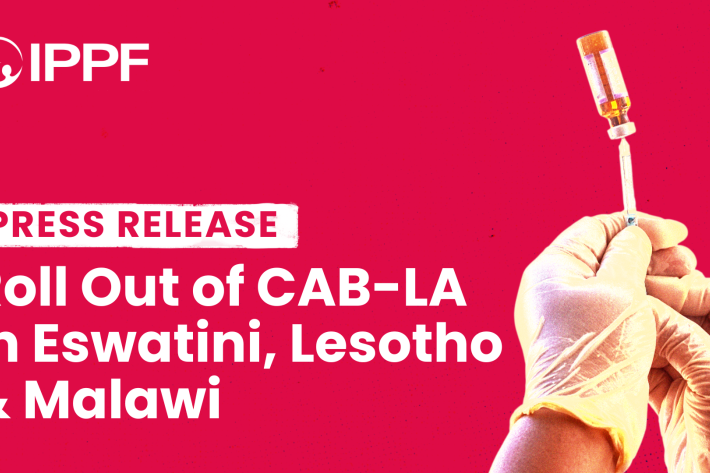Latest press releases
A selection of stories from across the Federation

Tanzania
Almost US$10 mil in US-Funded Contraceptives May Go to Waste in Belgium as Trump Administration Keeps Them In Holding
The Trump administration is holding over $9.7 million of U.S.-funded contraceptives set to be destroyed, with 77 percent of these resources destined for five countries in the African region.
For media enquiries
Telephone:
+44 7918 845944Email IPPF:
Email: media@ippf.org

| 17 April 2025
Rutgers triumphs in landmark court case against lies, online hate and disinformation
17 April 2025 - Rutgers, the Netherlands’ leading sexual and reproductive health expert and IPPF’s Member Association, has today secured a landmark legal win against an ultra-conservative group notorious for fuelling online hate and spreading disinformation. This ruling is a crucial step forward in protecting young people’s health, safety and well-being from harmful narratives designed to undermine their rights. Rutgers took legal action against Civitas Christiana, due to the persistent lies and slander that Civitas continued to spread about Rutgers and the Spring Fever Week. This is an annual campaign in the Netherlands, held in Spring, focused on resilience, heathy relationships and sexual health. The court ruled entirely in favour of Rutgers; all statements must be rectified. The statements by Civitas - made through their social media channels, mainstream media and direct outreach efforts - were not only found to be false, but also harmful and unlawful. This important decision affirms support for parents, teachers, and schools, all who are committed to ensuring children to grow up healthy, safe and happy and protected from disinformation and misinformation. Schools participate voluntarily in Spring Fever Week by providing structured, age-appropriate lessons on these topics to their primary school students. Rutgers took these legal steps to support parents, teachers, and schools, and to combat misleading and vexatious misinformation, as our work is unapologetically about child safety and protection. It’s about giving young people agency and keeping them safe from perpetrators. Young people without information and without bodily autonomy are unsafe. This case was about standing with and for the young people, parents, caregivers, educators and communities who are targeted and harmed by these toxic campaigns run by ultra-conservative groups. The court’s ruling sends a clear message: there is no place for hate and misinformation in public discourse, especially when it endangers the lives, safety and health of young people. “This legal case was not about a difference of opinion on education,” says Rutgers deputy director Luc Lauwers, “but about the spreading of fake news that puts children in danger rather than protecting them. Everyone has the right to their own values, beliefs, opinions, religious convictions, and way of life - including in matters of education and parenting. That is a fundamental pillar of our democratic legal system in the Netherlands. However, the freedom of expression and freedom of religion that Civitas Christiana appeals to are not without limits.” Victories like this matter deeply. At a time when sexuality education is under coordinated attack by alt-right movements globally, this victory speaks volumes about the power of civil society organisations to stand firm, fight back, and defend truth, science and young people’s rights. Anti-rights groups work to erode trust, sow fear and promote regressive narratives that do real harm - particularly to young people. Staying silent is not an option. Every time we speak up, seek justice and share the truth, we help build a society where young people are safe, informed and healthy. This ruling is a meaningful step, but our shared global responsibility continues. For media inquiries, please contact: n.hoeve@rutgers.nl or media@ippf.org.About the International Planned Parenthood Federation IPPF is a global healthcare provider and a leading advocate of sexual and reproductive health and rights (SRHR) for all. Led by a courageous and determined group of women, IPPF was founded in 1952 at the Third International Planned Parenthood Conference. Today, we are a movement of 158 Member Associations and Collaborative Partners with a presence in over 153 countries. Our work is wide-ranging, including comprehensive sex education, provision of contraceptive, safe abortion, and maternal care and responding to humanitarian crises. We pride ourselves on being local through our members and global through our network. At the heart of our mission is the provision of – and advocacy in support of – integrated healthcare to anyone who needs it regardless of race, gender, sex, income, and crucially no matter how remote. About RutgersRutgers is the Dutch centre of knowledge and expertise on sexual health, safety and well-being for young people. We work to improve the sexual and reproductive health and rights of all (young) people in the Netherlands and in more than 29 countries around the world. In partnership with other organisations we advocate for sexual and reproductive health and rights, promote public support and do (scientific) research.Together with partners, we work within countries and internationally to improve sexual rights, access to sexuality education and information, access to contraception and safe abortion services and to prevent sexual and gender-based violence.

| 10 November 2022
Sexual and reproductive justice to deliver the Nairobi commitments
Today, the International Planned Parenthood Federation (IPPF) is helping launch the second report of the High-Level Commission on the Nairobi Summit, also known as the International Conference on Population and Development 25 (ICPD 25). The Commission is an independent advisory board comprised of 26 members from different sectors tasked with monitoring progress on the ICPD Programme of Action and Nairobi Summit Commitments. The programme of action contains commitments from 179 countries to put the rights, needs and aspirations of individual human beings at the centre of sustainable development, part of which includes achieving universal access to sexual and reproductive health for all. The report - ‘Sexual and reproductive justice as the vehicle to deliver the Nairobi Summit commitments’ - highlights sexual and reproductive justice as the key to the realization of the Nairobi Summit commitments. Sexual and reproductive justice is a universal concept. It includes the right to have or not have children, the right to parent one’s children in safe and sustainable environments, and the right to sexual autonomy and gender freedom. Monitoring the implementation of life-saving sexual and reproductive health and gender-responsive services is crucial to ensure accountability and human rights for all. However, while some progress has been made, many barriers persist, and millions worldwide still do not realize their sexual and reproductive rights. Progress on Nairobi Summit Commitments: Numerous country commitments made at the Nairobi Summit align with a sexual and reproductive justice framework. They pay explicit attention to marginalized and vulnerable populations, notably people with disabilities, refugees, migrants (particularly migrant women), young people and older persons. Indigenous peoples, people of African descent and other ethnic minority groups have received less attention. A slew of new reproductive rights legislation followed the Nairobi Summit, suggesting a basis for a sexual and reproductive justice framework. The high number of commitments prioritizing sexual and gender-based violence offers a powerful entry point for promoting sexual and reproductive justice. On the Summit’s Global Commitments, some improvement is evident in meeting unmet need for family planning. But no region has registered positive movement towards zero preventable maternal deaths. Greater access to family planning has yet to translate into better maternal health outcomes. There is some progress in offering comprehensive and age-responsive information and education on sexuality and reproduction and adolescent-friendly, comprehensive, quality and timely services. Certain regions and countries have advanced in providing timely, quality and disaggregated data. More must be done, but this creates opportunities for ensuring that data capture intersecting challenges and are used to inform laws, policies and programmes. Domestic and international finance is critical to sexual and reproductive justice but persistently lags commitments. More than 4 billion people globally will lack access to at least one key sexual and reproductive health service during their lives Dr Alvaro Bermejo, Director-General for the International Planned Parenthood Federation, said: “Three years on from the Nairobi Summit and while we have seen some progress in sexual and reproductive health and rights across countries like Colombia, Mexico and Thailand, globally, we remain far from reaching the commitments made at ICPD 25 - that all women and girls will have autonomy over their bodies and lives through universal access to sexual and reproductive health and rights (SRHR). “With the devasting loss of abortion rights across the U.S having a disproportionate impact on poor women and women of colour, ongoing humanitarian crises across countries like Afghanistan, Ethiopia and Ukraine creating unliveable, unsafe and unsustainable conditions for millions, and the loss of billions of dollars of funding severely affecting access to sexual and reproductive health care for those most in need, 2022 continues to demonstrate the critical need to champion sexual and reproductive justice for all - recognizing the importance of intersecting oppressions on people’s ability to make decisions about their bodies, lives and futures. “At the International Planned Parenthood Federation (IPPF), we remain dedicated to helping countries deliver on the Nairobi commitments as we approach ICPD 30. Using our unique position as a locally-owned, globally connected organization, we will continue to work in solidarity with donors, governments, partners and communities to ensure that everyone, everywhere, can access high-quality SRH care, especially those who are most often excluded, locked out and left behind. “IPPF also urges governments to heed the Commission’s call to action and do more to achieve sexual and reproductive justice. This means tackling the economic, social and legal barriers that prevent its implementation, more financial investment, including in universal healthcare, increased solidarity with partners and the sense of urgency needed to get the job done. The lives and futures of millions depend on it.” For media enquiries, please contact Karmen Ivey on kivey@ippf.org or media@ippf.org About the International Planned Parenthood Federation The International Planned Parenthood Federation (IPPF) is a global service provider and advocate of sexual and reproductive health and rights for all. For 70 years, IPPF, through its 108 Member Associations and seven partners, has delivered high-quality sexual and reproductive healthcare and helped advance sexual rights, especially for people with intersectional and diverse needs that are currently unmet. Our Member Associations and partners are independent organizations that are locally owned, which means the support and care they provide is informed by local expertise and context. We advocate for a world where people are provided with the information they need to make informed decisions about their sexual health and bodies. We stand up and fight for sexual and reproductive rights and against those who seek to deny people their human right to bodily autonomy and freedom. We deliver care that is rooted in rights, respect, and dignity - no matter what.
















